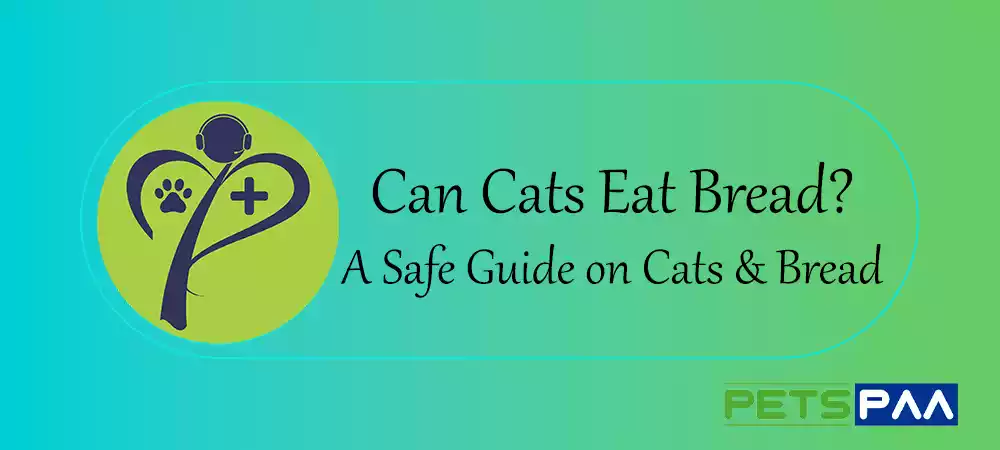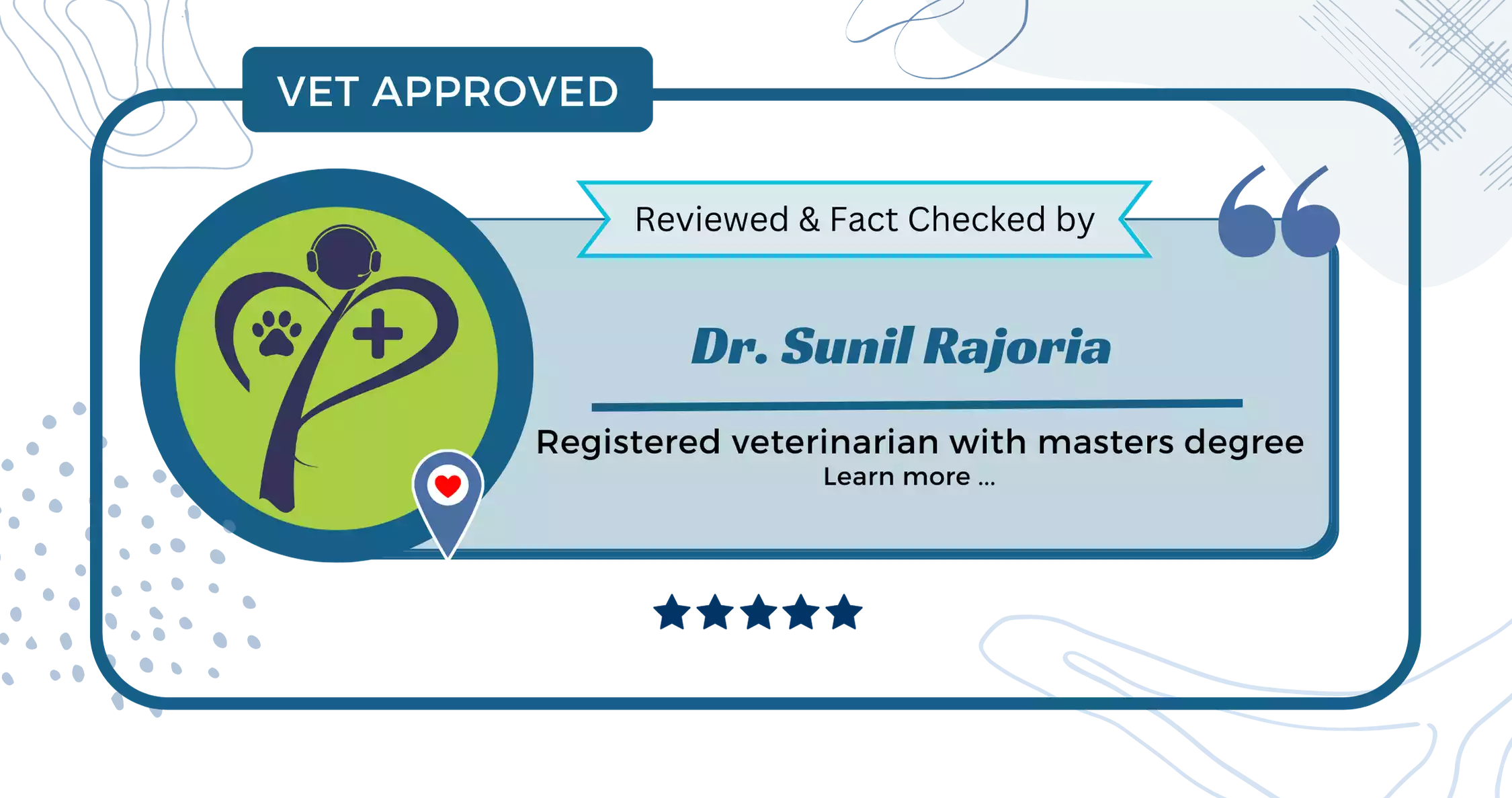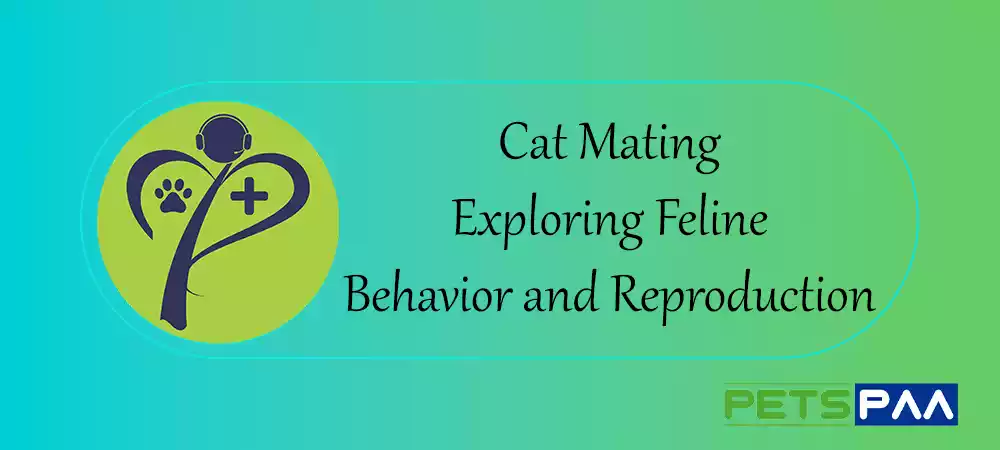Can Cats Eat Bread? A Safe Guide on Cats and Bread
If you own a cat, you may have pondered if it is safe to share a slice of bread with your feline companion. Bread is a common home staple, but there are certain things to keep in mind when it comes to cats.
In this post, we will look at cats and bread, giving you vital information on which varieties of bread are safe to eat and which to avoid. Let us investigate this fascinating question: Can cats eat bread?
Table of Contents
Can Cats Eat Bread?
Cats are obligate carnivores, which means their bodies are built to thrive on meat. While bread does not provide any vital nutrients for cats, it is typically safe for most cats to ingest modest portions of plain bread. However, it is essential to select the appropriate varieties of bread and to maintain moderation.
Is it safe for your cat to eat bread?
While some varieties of bread may be dangerous to cats, most cats may safely ingest modest amounts of plain bread. Plain bread with no additives, spices, or xylitol is unlikely to damage your cat right away. Bread, on the other hand, has very little nutritious value for cats and should not constitute a large portion of their diet.
Breads that are safe for cats
Now you don’t need to worry about “can cats eat bread“. A Plain fully cooked bread is safe for cats to eat such as white bread, wheat bread, rye bread, pumpernickel bread, and sourdough bread.
- Plain White Bread: Cats may safely eat plain white bread without any additions, spices, or spreads. It should be served in little amounts as a rare treat.
- Whole Wheat Bread: Cats may eat whole wheat bread in moderation as long as it is devoid of dangerous substances or additions. Remember that moderation is essential.
- Plain Rolls: such as dinner rolls or bread rolls, might be a good alternative for cats. Ensure that they are devoid of any potentially dangerous spices, garnishes, or fillings.
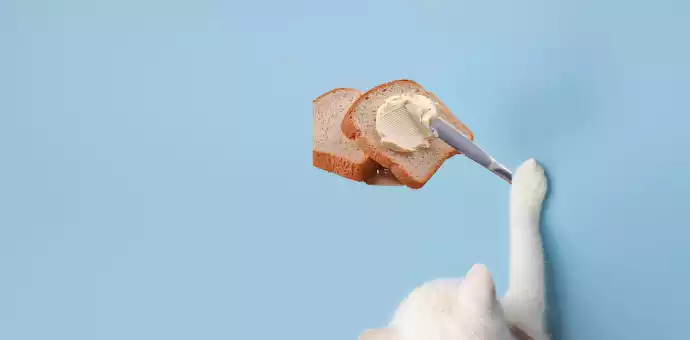
Bread to Avoid If You Have a Cat
Cats should not eat uncooked bread that has ingredients added to them, such as garlic, zucchini, raisins, and chocolate chips. Besides these avoid these breads for safety:
- Flavored Bread: Flavored bread, such as garlic bread or herb-infused bread, frequently contains substances that are poisonous to cats, such as garlic, onions, or different spices. It is critical to keep various sorts of bread away from your kitty pet.
- Xylitol bread: Xylitol is a sugar replacement that is typically present in sugar-free bread or baked products. It is extremely harmful to cats and should be avoided at all costs. Even a modest quantity might cause hazardous blood sugar drops.
- Nut Bread: Cats shouldn’t be given nut bread, such as walnut or macadamia nut bread. Because of their high-fat content, nuts are typically not suggested for feline eating owing to digestive difficulties.
- Unbaked Bread Dough: Unbaked bread dough might be dangerous to cats. As the yeast in the dough ferments, it creates carbon dioxide and alcohol, which can cause bloating, gas accumulation, and alcohol poisoning. It is critical to keep cats away from unbaked bread dough.
The Advantages of Feeding Cats Bread
The advantages of feeding bread to cats include:
- Non-toxic cat treats: As long as there are no health concerns, a small slice of baked bread (simply white, wheat, or pumpernickel bread) is appropriate as an occasional snack.
- A fantastic approach to conceal medication: no one like taking medications, least of all our feline companions. However, if you have a bread-loving cat and their health allows it, hiding their medicine in a piece of bread is OK. “Though it’s not my first choice, I’m fine with it as a means of getting meds in,” PetsPaa says.
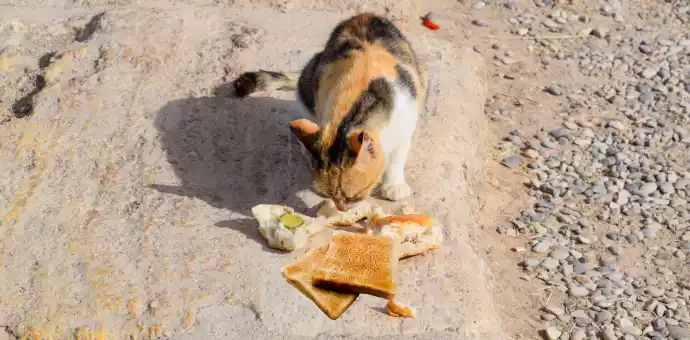
Is bread good for cats' health?
While bread is not required for a cat’s diet, there are a few potential advantages to consider. Some cats may like plain bread as an occasional treat or to relieve slight stomach pain.
However, it is crucial to emphasize that these advantages are anecdotal, and bread should not be used as a major source of nutrition or to treat any underlying health conditions.
Is bread harmful to cats?
While little portions of plain bread are typically safe for cats, there are certain drawbacks to be aware of:
The Drawbacks of Feeding Cats Bread
- The bread offers no health benefits to cats as they require nutrients from animal products.
- Each cat is different, and while some may tolerate a small amount of bread, others may experience digestive discomfort.
- Cats with health conditions like diabetes, heart disease, or kidney disease should not be fed bread.
- Avoid feeding your cat bread that contains ingredients like onions, garlic, chives, chocolate, raisins, or nuts, as they are toxic to cats.
- Check the bread’s ingredients for xylitol, a sweetener that is toxic to cats and dogs.
- Cats have special nutritional needs, and eating bread might cause digestive distress, such as diarrhea or constipation.
- Bread lacks nutritional benefits for cats and is high in calories, and low in protein.
- Feeding bread to cats may reduce their appetite for balanced cat food.
- A single slice of white bread contains a significant portion of a cat’s daily calorie requirement but lacks essential nutrients.
- Uncooked bread dough can be dangerous for cats as it can expand in their stomach, leading to bloating and a distended stomach.
- In some cases, the bloating caused by raw bread dough can be life-threatening for cats.
- The yeast used in bread fermentation produces carbon dioxide and ethanol alcohol, which can be harmful to cats.
- Alcohol can lead to severe health issues and even death in cats.
- Carefully review bread ingredients and avoid feeding anything that could be harmful to your cat’s health.
Given these considerations, it is preferable to reduce bread intake for cats and instead focus on a balanced, nutritionally complete cat diet.
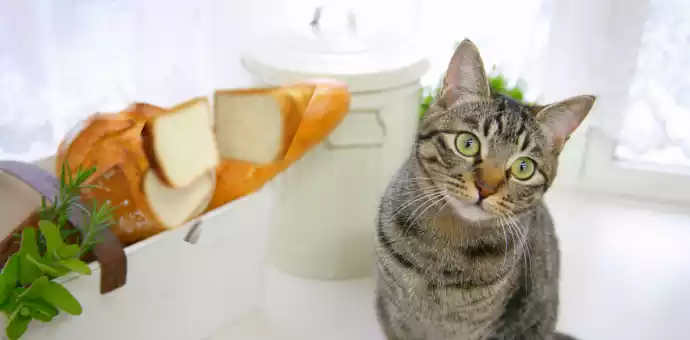
How to Feed Your Cat Bread Safely
If you wish to share a little slice of simple bread with your cat, observe these precautions:
- Only basic bread with no additions, spices, or spreads is available.
- Limit yourself to a little slice or a few crumbs.
- Tear the bread into small, cat-bite-sized pieces for easy consumption.
- Always put your cat’s usual balanced cat food ahead of bread.
- Remember that bread should be a treat, not a fixture in your cat’s diet.
- Calculate the portion size of bread based on the 10% rule: treats should not exceed 10% of your cat’s daily caloric intake.
- Check the nutrition label and ingredient list of the bread for calories and potentially harmful additives.
- Monitor your cat for any signs of gastrointestinal issues after consuming bread.
Introduce new foods one at a time to identify any adverse reactions. If your cat shows signs of illness or adverse reactions to bread, contact your veterinarian for guidance.
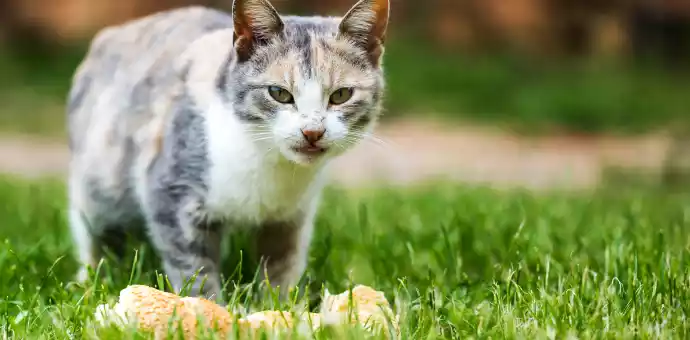
Clarifying Some Common Misconceptions About Cats and Bread
Can Cats Eat Bread and Butter?
We as PetsPaa advise against feeding bread and butter to cats. Bread has little nutritional benefit for cats, and butter is heavy in fat, which can cause digestive discomfort or pancreatitis in cats. To fulfill their special dietary demands, it’s important to keep balanced and nutritionally complete cat food.
Can Cats Eat Bread Crust?
In general, cats can eat the bread crust in moderation. However, it is critical to verify that the crust has no dangerous additions or components. The safest option for cats is a plain bread crust with no extra spices, condiments, or toppings.
Can Cats Eat Bread?
When it comes to cats and bread, we generally agree that tiny amounts of plain bread are unlikely to cause immediate harm to cats. However, it is critical to remember that bread should not be used in place of their usual balanced cat food. Moderation is essential, and if you have any worries or questions regarding your cat’s diet, speak with a veterinarian.
Can Cats Eat Brown Bread?
Brown bread, like any other variety of bread, is not required in the diet of a cat. While modest portions of plain brown bread are typically safe for cats, keep in mind that bread has very little nutritional value for them. It should only be given as a treat, not as a replacement for their usual cat food.
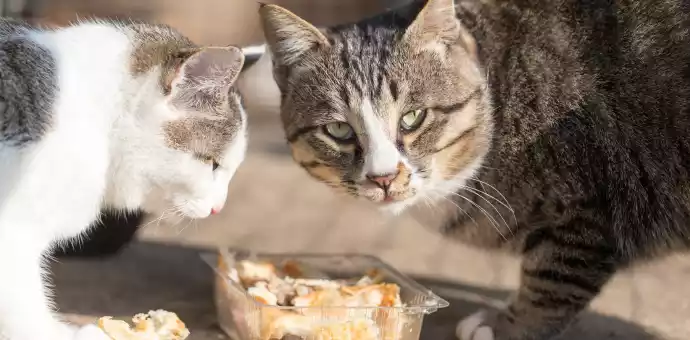
Can Cats Eat Cheese with Bread?
Cheese is typically not advised as a regular part of a cat’s diet. While some cats appreciate the flavor of cheese, it is heavy in fat and lactose, which can cause digestive problems such as diarrhea or upset stomach. If you want to give your cat a little slice of cheese as a treat, go for low-fat, lactose-free varieties.
Can Cats Eat Bread and Milk?
Adult cats should not drink milk, contrary to common opinion. The majority of adult cats are lactose intolerant, and drinking milk can result in stomach discomfort, including diarrhea.
While some cats may accept modest quantities of milk without difficulty, it’s better to avoid giving it to them in general. Bread has little nutritional value and shouldn’t be used in place of a well-balanced cat diet.
Can Cats eat Biscuits?
Some biscuits may be okay for cats to eat in moderation, depending on the ingredients. The safest choice is plain, unsalted, and unbuttered biscuits with no dangerous ingredients or flavors.
However, keep in mind that cats have special nutritional requirements, and biscuits should not be used in place of well-balanced cat food.
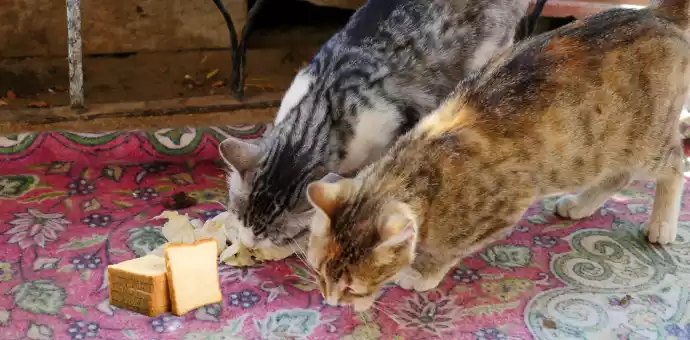
Conclusion
At last on the topic “Can cats eat bread” we can conclude that bread is not poisonous to cats in moderation, it is vital to exercise caution when serving it as a treat.
Plain bread with no dangerous components is typically safe for cats, but it should not replace their regular cat food. Always put your cat’s nutritional requirements first, and visit a veterinarian if you have any concerns about their food.
FAQs (Frequently Asked Questions)
Bread is unlikely to cause immediate harm to a cat if it is eaten in moderation. Excessive bread eating, on the other hand, might cause digestive difficulties and significant weight gain in cats.
Most cats can tolerate a little slice or a few crumbs of basic bread on occasion. However, it is essential to speak with a veterinarian about your cat’s unique nutritional needs.
In moderation, plain white bread with no additions or dangerous chemicals is typically safe for cats to ingest.
The yeast in sourdough bread can cause stomach problems in cats. It is advised to avoid giving your cat sourdough bread.
Sugar, spices, and nuts are common elements in banana bread that are toxic to cats. It is advised to avoid giving your cat banana bread.
Garlic is poisonous to cats, so avoid eating garlic bread. Garlic can cause serious health problems in cats, including anemia.
Pumpkin bread frequently contains spices and other components that are toxic to cats. It is advisable to avoid giving your cat pumpkin bread.
Plain, unseasoned bread that is free of hazardous substances or additions is typically acceptable for cats to eat in moderation. Plain white bread and whole wheat bread are two examples.
Small portions of plain bread are unlikely to hurt cats immediately. Excessive bread intake, on the other hand, might cause digestive difficulties and consequent weight gain.
The aroma and texture of bread may attract cats. However, it is critical to focus on their nutritional needs and serve bread solely as a treat on occasion.
Cats should eat bread in moderation. A tiny slice or a few crumbs every now and again is normally fine, but it should not constitute a large portion of their diet.

